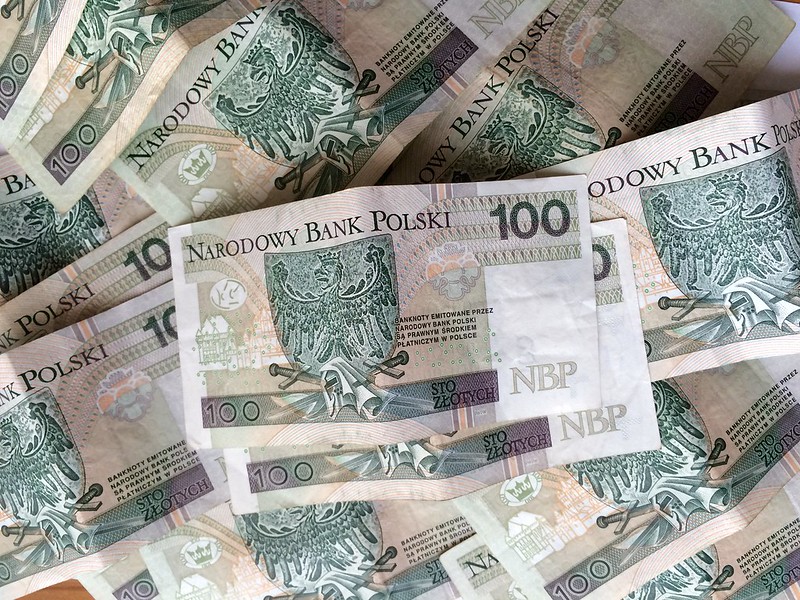Payments in cash between consumers and businesses are to be limited to 20,000 zloty from the beginning of 2024. The change, which has been criticised by business associations and the junior party in the ruling coalition as an attack on civil liberties, will be introduced a year later than planned.
Meanwhile, amid dwindling popularity of cash payments in Poland, a widely used network of cash machines has further reduced withdrawal limits in response to rising costs.
From 1 January 2024, payments from consumers to businesses over 20,000 zloty (€4,200) will only be allowed by bank transfer, reports Money.pl. Business-to-business cash payments, currently capped at 15,000 zloty, are to be limited to 8,000 zloty (€1,680) under the new regulations.
The changes will enter into force 12 months later than the government had intended after President Andrzej Duda signed an amendment to the law on mortgage credit. The change was originally meant to come in as an amendment to the law on consumer rights from 1 January 2023.
“Transactions between companies should be transparent and non-cash,” the finance ministry argued when originally presenting the changes. Experts stated that its aim is to “reduce the grey economy”, reported Rzeczpospolita when they were first mooted at part of the government’s Polish Deal reform programme.
At a press conference, Marcin Warchoł, a deputy justice minister who is a member of the United Poland (Solidarna Polska) party, described reports of imminent curbs on cash payments as “fake news”. He boasted that his party had “protected cash and freedom”, although commentators pointed out that the change had only been delayed, not scrapped.
Panie Pośle, dziękujemy za zwrócenie uwagi. Gdyby nie "prostota" uchwalanych zapisów (screen), może byłoby łatwiej je wyłapywać. Poprawimy tekst. Zwrócę nieśmiało uwagę, że Pan także pisze nieprawdę. Nie obroniliście Państwo gotówki, jedynie odłożyliście wyrok na nią. O rok. pic.twitter.com/97r3w4DGBa
— Marcin Dziadkowiak (@Trej__) August 18, 2022
“This is good news for everybody who loves freedom,” Warchoł said, quoted by Money.pl. “Cash also means freedom and safety of the citizen to buy goods and pay for services without the need to set up an account or pay by card,” he added.
The changes have been criticised by organisations including the Union of Entrepreneurs and Employers (FPP), which said in a statement that “cashless forms of payments are undoubtedly developing, yet many consumers still prefer cash – whether out of habit or for other reasons (such as protecting privacy)”.
The FPP also notes that Poland has been a pioneer of cashless technology, and that some 47.3% prefer to make such payments, although 32.6% still prefer to use more traditional payment methods.
“Reducing cash circulation at a time of major geopolitical tensions and the war in Ukraine could constitute a threat to the state’s cybersecurity,” the union adds, quoted by Business Insider.
Michał Borowski of the Business Centre Club agreed, telling Money.pl that as banknotes are legal means of payment in Poland, introducing limits on transactions is an intrusion into civil liberties.
Adam Glapiński, Poland’s central bank chief, has been a consistent defender of cash. Last year he praised the “sense of freedom” it gave, associated with the anonymity of paying for goods – “this is very important for a market economy, based on freedom of economic choice by both businesses and consumers”.
In a separate development, Euronet, which owns around a quarter of the cash machines in Poland, has reduced the maximum amount that can be withdrawn to 800 zloty (€168) from 1,000 zloty. Other networks including Planet Cash have also reduced limits in recent years.
This continues a gradual reduction in limits, which until 2017 ranged between 2,500 and 4,000 zloty for Euronet machines, reports Business Insider.
The number of cash machines has also been dropping in Poland as card payments for small transactions become more popular. There are currently 20,888, a 9% drop on the number in late 2018.
“The amounts we receive from payment organisations and banks do not cover the costs of servicing withdrawal transactions, and the situation is worsened by recent increases in costs associated with macroeconomic factors out of our control,” said Euronet in a statement explaining the change.
Zakopane, Polish Tatra Mountains. The best place in the world for cash machine!#cashmachine #euronet #polska #cash #banking pic.twitter.com/RhVS17xOFj
— Tomasz Borysiuk🇵🇱 (@TomaszBorysiuk) February 20, 2017
Main image credit: Flickr/Dariusz Gąszczyk (under CC BY 2.0)

Ben Koschalka is a translator, lecturer, and senior editor at Notes from Poland. Originally from Britain, he has lived in Kraków since 2005.



















